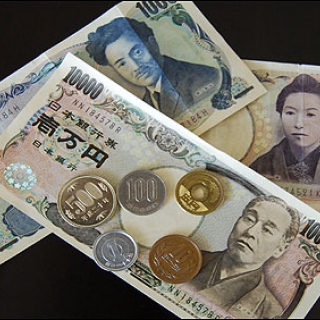


The Japanese Yen (JPY) attracted fresh buyers at the start of a new week and remained within striking distance of its highest level since late September 2024 hit against the broadly weakening US Dollar (USD) last Friday. Concerns about the rapidly escalating US-China trade war and its impact on the global economy continued to support traditional safe-haven assets, including the JPY. Further, hopes that Japan might reach a trade deal with the US turned out to be another factor offering support to the JPY.
Meanwhile, signs of broadening inflation in Japan keep the case for further interest rate hikes by the Bank of Japan (BOJ) open. In contrast, investors have been pricing in the possibility of aggressive policy easing by the Federal Reserve (Fed) amid concerns that the escalating US-China trade war will hamper US economic growth. This would result in a further narrowing of the interest rate differential between Japan and the US, suggesting that the path of least resistance for the low-yielding JPY is to the upside.
Japanese Yen supported by global flight to safety, BoJ rate hike bets
China's 84% tariffs on US goods came into effect on Thursday, while US President Donald Trump raised duties on Chinese imports to an unprecedented 145%. The developments fueled concerns about the potential economic impact of an escalating trade war between the world's two largest economies and drove some safe-haven flows into the Japanese Yen.
Investors remain optimistic about a positive outcome from US-Japan trade talks. In fact, Trump said last week that tough but fair parameters are being set for negotiations. Additionally, US Treasury Secretary Scott Bessent said that Japan may be a priority in tariff negotiations, fueling hopes for a possible US-Japan trade deal and further supporting the JPY. Japanese Prime Minister Shigeru Ishiba warned on Monday that "US tariffs have the potential to disrupt the world economic order.
" Separately, Japanese Finance Minister Shunichi Kato said that "the US and Japan share the view that excessive foreign exchange volatility is undesirable." In addition, Japanese Economy Minister Ryosei Akazawa stated that "foreign exchange issues will be handled by Finance Minister Kato and US Treasury Secretary Scott Bessent." Meanwhile, the Bank of Japan's preliminary report released last Thursday showed that annual wholesale inflation accelerated to 4.2% in March. This is a sign of persistent cost pressures, which, together with strong wage growth, should contribute to rising domestic inflationary pressures and allow the BoJ to continue raising interest rates this year.
In contrast, the latest reading of the US Consumer Price Index showed that inflation slowed sharply in March. This comes on top of weakening confidence in the US economy and should allow the Federal Reserve to resume its rate-cutting cycle. Moreover, market participants are now pricing in a possible 90 basis point rate cut by the end of this year. The divergent BoJ-Fed policy expectations turned out to be another factor that benefited the lower-yielding JPY. On the other hand, the US dollar languished near its lowest level since April 2022, hit on Friday. This, in turn, dragged the USD/JPY pair back closer to multi-month lows during the Asian session on Monday and supports prospects for a further decline.(Newsmaker23)
Source: FXstreet
The USD/JPY pair declines on Tuesday to around 153.50 at the time of writing, down 0.40% on the day, as the Japanese Yen (JPY) attracts fresh safe-haven flows amid renewed global risk aversion. Fears ...
The Japanese yen remains under pressure against the strengthening US dollar, reaching its lowest level since last February. Markets remain uncertain about when the Bank of Japan (BoJ) will raise inter...
The Japanese yen strengthened, breaking through 152 per US dollar on Wednesday (October 29th), continuing its two-day rally. Market participants are positioning themselves ahead of this week's Bank of...
The USD/JPY pair extends the rally to a two-week high near 152.65 during the early Asian session on Friday. The Japanese Yen (JPY) weakens against the US Dollar (USD) as traders weigh fresh US sanctio...
The Japanese yen weakened earlier this week following reports that the Liberal Democratic Party (LDP) and the Japan Innovation Party (JIP) had agreed to form a coalition government. This agreement ope...
The Trump administration suspended docking fees for Chinese-built ships as part of a "trade truce" last month. The move has drawn criticism for weakening U.S. efforts to protect port access—so-called privileges—and increasing supply chain...
Asian stocks slipped at the open on Friday (November 7), following a choppy session on Wall Street. The MSCI Asia Pacific Index fell about 0.2%, led by losses in Japan, while South Korea and Australia also edged lower. In the US, the S&P 500...
Japanese stocks weakened on Friday following an overnight plunge in US technology stocks. A stronger yen also weighed on sentiment, with chip-related stocks leading the decline. Renesas Electronics fell 3.9%, SoftBank Group slumped 7.3%, and...
 Asia-Pacific markets declined on Wednesday, following a decline on Wall Street, which was driven by concerns about the valuations of artificial...
Asia-Pacific markets declined on Wednesday, following a decline on Wall Street, which was driven by concerns about the valuations of artificial...
 The Institute for Supply Management (ISM) is scheduled to release its October Services Purchasing Managers' Index (PMI) on Wednesday. The report, a...
The Institute for Supply Management (ISM) is scheduled to release its October Services Purchasing Managers' Index (PMI) on Wednesday. The report, a...
 World markets kicked off November in an upbeat mood, riffing off buoyant company earnings and calmer trade relations while batting away OPEC's...
World markets kicked off November in an upbeat mood, riffing off buoyant company earnings and calmer trade relations while batting away OPEC's...
 The ISM Services PMI rose to 52.4 in October 2025 from 50 in September, beating forecasts of 50.8, pointing to the strongest expansion in the...
The ISM Services PMI rose to 52.4 in October 2025 from 50 in September, beating forecasts of 50.8, pointing to the strongest expansion in the...